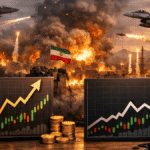A gaggle of Moroccan researchers has introduced the launch of a brand new system designed to stop diploma fraud whereas making certain uniformity and price effectivity utilizing blockchain know-how.
The brand new blockchain-based system will depend on Ethereum sensible contracts to automate the issuance of diplomas upon assembly sure standards. Dubbed BlockMEDC, the brand new system will lean on decentralized file storage capabilities of distributed ledgers, sidestepping the challenges of conventional diploma issuance.
The analysis crew contains specialists from the Sultan Moulay Slimane College and the Mohammed First College. The joint crew has discovered early success with the blockchain-based resolution, submitting a patent and publishing their analysis in high know-how journals globally.
A detailed have a look at the analysis paper reveals that college students and lecturers could have a “distinctive digital tutorial account.” The blockchain-based system will assist real-time grade monitoring, and college students will obtain immutable digital certificates on a distributed ledger.
By being primarily based on distributed ledgers, potential employers and different events can leverage the perks of transparency to entry the tutorial histories of job candidates. Other than the transparency options, a blockchain-based diploma dispenses with the necessity for paper certificates, saving tutorial establishments a small fortune.
The mission is restricted to universities, however the researchers are eyeing an integration into the whole Moroccan instructional system. Preliminary steps are underway to combine the blockchain-based diploma resolution into the MASSAR instructional platform.
Moreover, the researchers say the mission’s success in schooling will result in enlargement into different sectors. On the high of the checklist for the researchers are the well being and vitality sectors, key areas in dire want of technological reform.
Morocco’s important sectors have been hit by a wave of cyberattacks, with authorities eager on exploring rising applied sciences to remain forward of the curve.
Morocco leverages rising applied sciences for financial development
The North African nation’s tango with next-gen know-how transcends stifling fraud or protecting cyberattacks at bay. Morocco is actively pursuing digitization by integrating blockchain and synthetic intelligence (AI) into important sectors of the financial system.
The nation targets a ten% GDP spike by 2030 from the concerted effort of rising applied sciences powered by a raft of presidency initiatives. Regardless of the nationwide embrace, authorities are kicking in opposition to utilizing digital property within the nation, brandishing a crackdown in opposition to violators.
AI analysis funding proposals attain document excessive in Europe
In the meantime, AI funding proposals have surged to succeed in an all-time excessive within the EU, underscoring the widespread adoption of the know-how in important sectors.
The European Analysis Council (ERC) has confirmed the spike within the variety of AI analysis funding proposals acquired during the last yr. ERC Vice President Eystein Jansen disclosed the pattern throughout GITEX 2025, Europe’s largest tech occasion in Germany.
In his keynote handle, Jandsen revealed that the “super rise” in funding functions for AI analysis requires seismic structural adjustments to the ERC’s inside operations. Going ahead, the ERC will create specialised panels to guage analysis proposals, given the proliferation of AI in most funding proposals.
“We additionally see that, in nearly all fields of analysis, synthetic intelligence is now part of the traditional toolbox of scientists,” mentioned Jansen. “This wasn’t the case a couple of years again—this has revolutionized analysis.”
Jansen provides that the values of ERC grants are on the rise, citing international inflationary pressures and macroeconomic uncertainties. The common grant measurement for a brand new scientist sits at €1.5 million ($1.7 million), whereas skilled AI researchers can obtain €2.5 million ($2.8 million) from the ERC.
The ERC usually distributes $2.8 billion yearly to round 1,000 funding candidates, with the determine tipped to rise in tandem with the spike in AI-based scientific analysis. Jansen urged scientific establishments in Turkey to submit analysis proposals to the ERC, noting that the Council has funded 40 tasks within the nation.
Jansen notes that Europe has to proceed past mere analysis on rising applied sciences to develop sensible options. He argues that the continent is enjoying catch-up with different areas when it comes to real-world AI functions.
“We have to scale up and transfer that competence into functions,” added Jansen.
AI regulation could hinder real-world utility
Whereas establishments are amplifying requires mainstream adoption of AI know-how in Europe, rules could also be a stumbling block for real-world utility. The EU not too long ago handed a landmark AI Act, however watertight guidelines on schooling, well being, and safety danger ranges are slowing down adoption.
Moreover, regulatory businesses have opened a number of investigations in opposition to AI firms in Europe. OpenAI, Meta (NASDAQ: META), and Anthropic have come below fireplace from European regulators for breaching copyright, information privateness, and antitrust guidelines.









